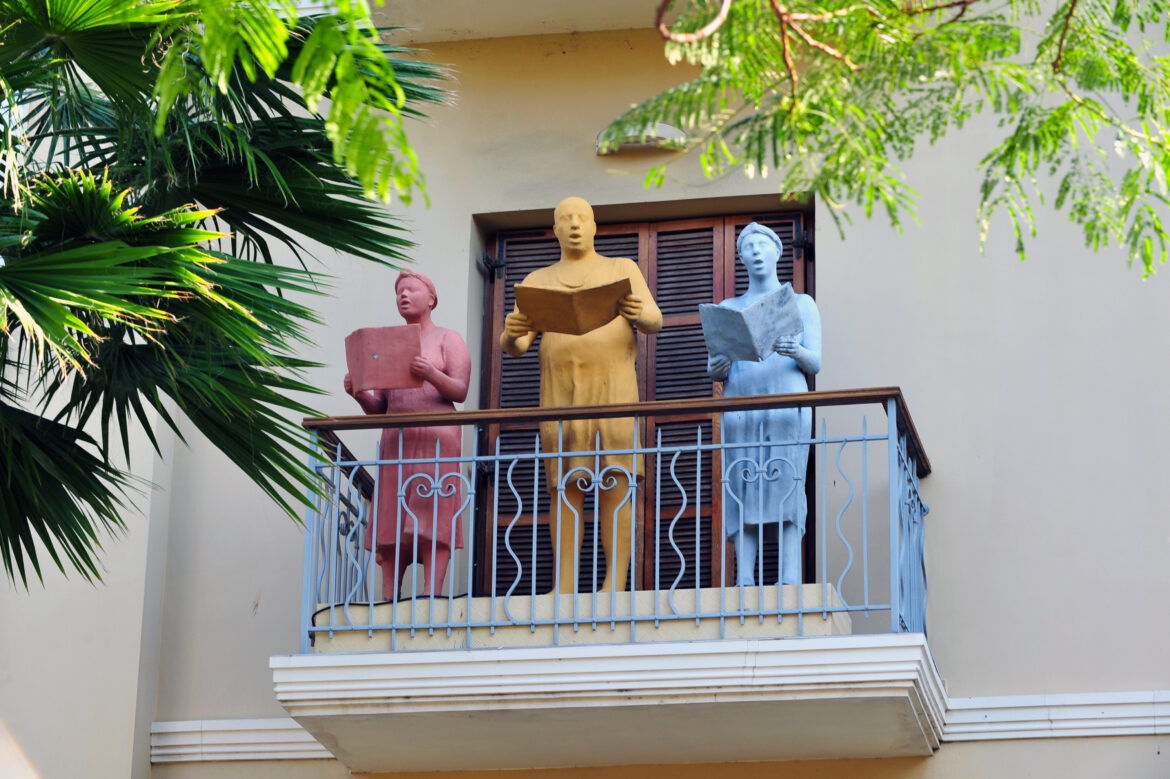“When you feel down and out, sing a song,” sang Earth, Wind, and Fire. Research suggests it’s a good prescription.
When I visited Venice, Italy many years ago, what struck me most—after the gorgeous skies and the pastel colors that washed the ancient buildings and danced on the water—was the singing, the music of daily life that spilled out of windows, echoed in the alleys, and skated across the canals. The city had a soundtrack like no other. It was the voices of women singing while they cooked, old men serenading their neighbors, children chirping nursery rhymes. It wasn’t the individual voices that were impressive, but the way they merged to create something bigger than the sound of each voice alone.
That’s what’s happening during the COVID-19 pandemic—voices are rising up and the citizens of the world are spontaneously creating a soundtrack to an event that’s unprecedented in our lifetimes. In these uncertain days, people are soothing themselves and others by singing in unison, harmonizing from windows and balconies, in the streets at a social distance, and, especially, alone together via Zoom.
Grieving, grateful, fearful, angry, and hopeful, they’re transforming their emotions and lifting one another’s spirits. You’ve seen it: the singalongs, the Jimmy Fallon remixes, parodies, quarantine livestreams, virtual concerts, impromptu block choirs, and the heartfelt balcony tributes to healthcare workers. Across social media people are merging their voices. And for good reason. Singing with others has the power to create community and connectivity at the same time that it’s physically and emotionally healing.
There was a time when singing together was a common occurrence. Music bonded people in times of mourning, during celebration, and in worship. It’s been part of healing and spiritual ceremonies since time began. But for some of us, singing in assembly in grade school was the last time we sang with people. And for others, singing as a communal activity occurs only in places of worship. “Singing together is a marvelous thing,” trauma expert Bessel Van Der Kolk, MD, told Dani Shapiro on her Family Secrets Podcast. “It really makes you feel cheerful, optimistic, and connected. But we don’t sing anymore.”
We should. In a YouTube video from the National Institute for the Clinical Application of Behavioral Medicine (NICAB), Van Der Kolk, author of “The Body Keeps the Score: Brain, Mind, and Body in the Healing of Trauma,” points to the calming power of singing, observing how in national emergencies, such as 9/11, people gathered and sang.
Even in non-emergent situations, singing is healing. And while singing in the shower might lift your mood, singing with others multiplies the rewards. Research indicates that singing does the body good in numerous ways. Studies have shown that it strengthens the immune system, increases lung capacity and reduces symptoms of asthma, enhances brain development in children, improves posture, and may help relieve pain. It lowers the heart rate and decreases blood pressure, which may have implications for heart health.
Recent studies involving people with Parkinson’s disease show that singing not only improves their motor symptoms but also enhances mood and reduces the indicators of stress. It’s also helped stroke victims speak again. New Zealand’s Centre for Brain Research is studying the CeleBRation Choir, a community singing group made up of people who have—or whose loved ones have—communication difficulties related to neurological problems. For years it’s been led on a weekly basis by a registered music therapist, and during quarantine it continues via Zoom. The center’s research indicates that singing not only improves mood and quality of life but also actually helps “rewire the brain” after damage.
Singing is a boon for emotional health as well. Group singing, participants report, is exhilarating. It causes the release of endorphins, which produces sensations of pleasure, and oxytocin, which enhances bonding. At the same time, it reduces the secretion of the hormone cortisol, resulting in a reduction in stress. It takes your mind off your worries, thus relieving anxiety, and may help people recover from depression.
Perhaps most important during the pandemic, singing can bridge the distance we feel and build community, even when we can’t be together physically. According to the website of the UK’s Association of Anthroposophic Therapeutic Arts, “Whether we sing or actively listen to someone else sing, our emotional life is affected and the connection to ourselves and our surroundings is deepened.”
“Sing together,” Van Der Kolk says in NICAB’s video, “Get into rhythmical harmony with other people,” he urges, observing that our “core mammalian sense of safety is from synchronous sounds and movements with other people.”
Don’t worry if you can’t sing, because of course you can. One study has shown that the rewards of group singing stand even when the singers lack training or experience. There’s no need to judge yourself; just open your mouth and sing. Sing alone if you must, but if you can, add your voice to the voices of others. Gather some friends and organize your own Zoom choir, meet up with your neighbors at a social distance and sing together, or join an existing choir (look for possibilities here and here).
Check out the following videos for inspiration. And sing along!
BEFORE YOU GO…
- Please leave a comment below and share your thoughts.
- Let us know what you want to see in Severance. Send a message to bkjax@icloud.com
- Tell us your stories. See guidelines at https://severancemag.com/submission-guidelines/
- If you’re an NPE, adoptee, or donor conceived person; a sibling of someone in one of these groups; or a helping professional (for example, a therapist or genetic genealogist) you’re welcome to join our private Facebook group at https://www.facebook.com/groups/402792990448461
- And like us on Facebook at https://www.facebook.com/severancemag and follow us on Twitter and Instagram @Severancemag




